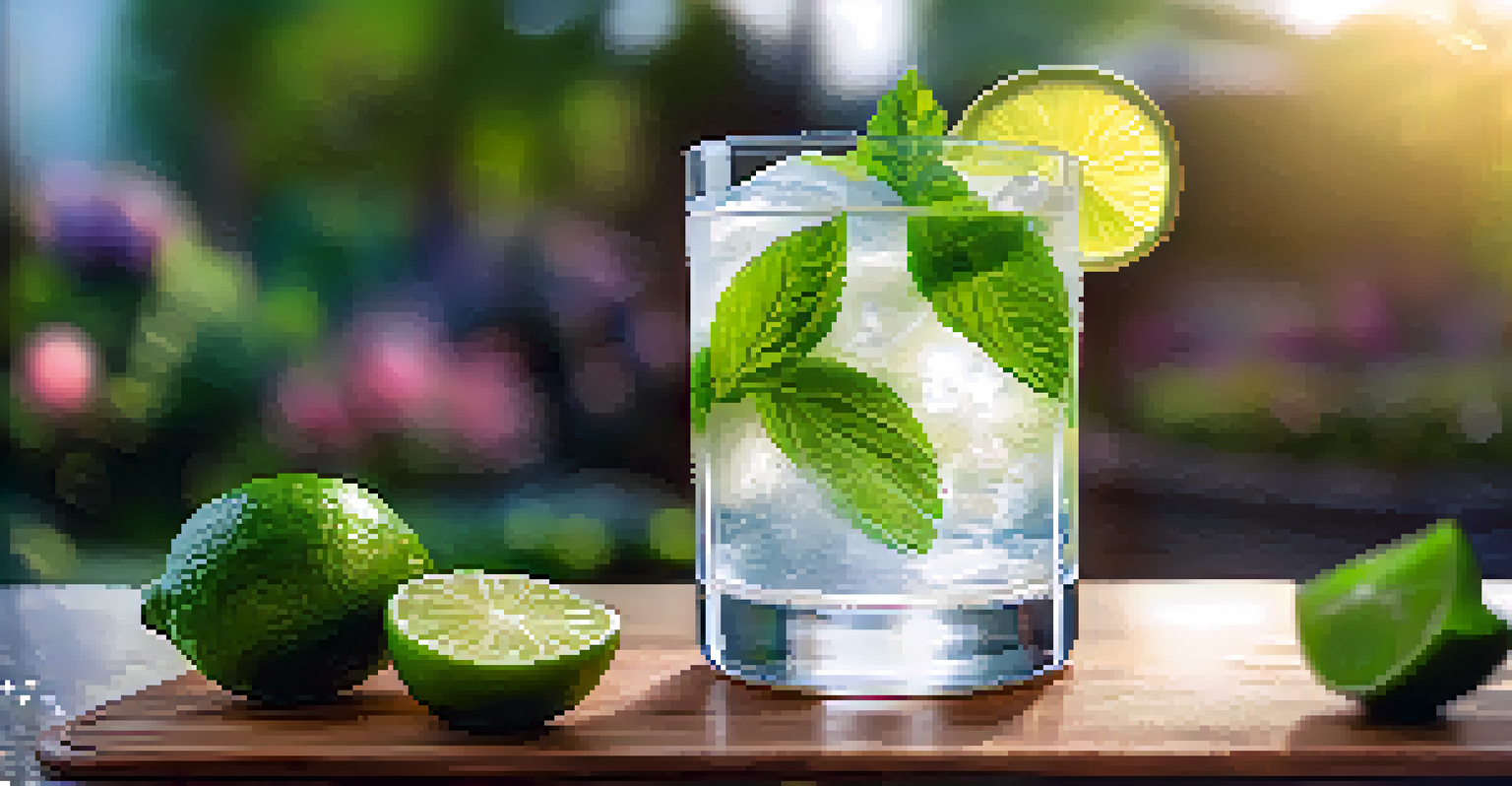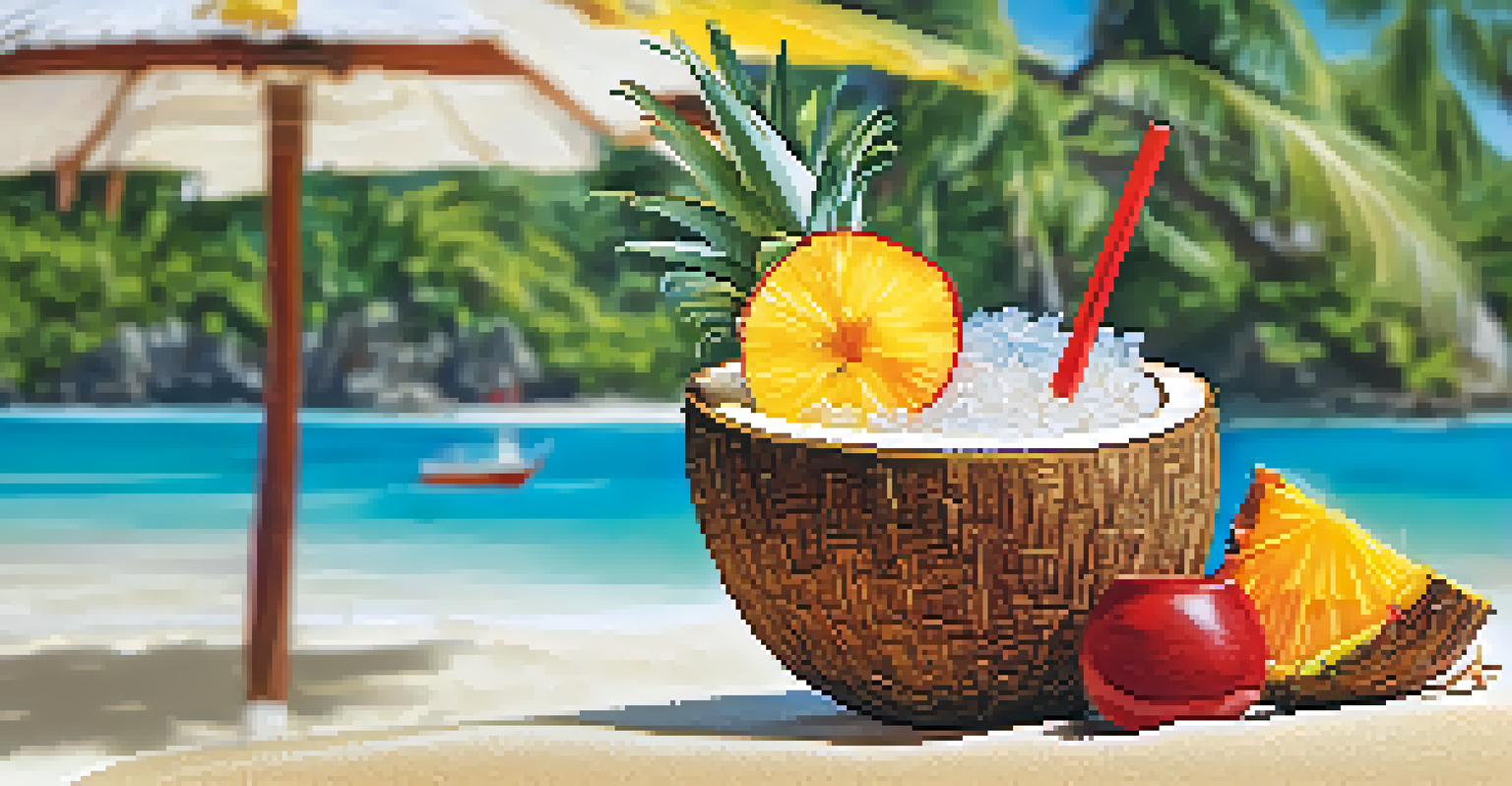Understanding the Different Types of Distilled Spirits

What Are Distilled Spirits and How Are They Made?
Distilled spirits, often referred to as hard liquor, are alcoholic beverages created through the process of distillation. This process involves heating a fermented liquid to separate alcohol from water and other components, resulting in a higher alcohol content. Spirits typically contain at least 20% alcohol by volume (ABV), making them stronger than wine or beer.
Whiskey is liquid sunshine.
The journey of distilled spirits begins with fermentation, where sugars are converted into alcohol by yeast. Once fermentation is complete, the mixture is heated in a still, allowing the alcohol to evaporate and then condense back into liquid form. This concentrated liquid is what we enjoy as various types of spirits, each with its own unique flavor profile and characteristics.
Understanding how spirits are made gives you a greater appreciation for the craft behind them. Whether you're sipping on whiskey, gin, or rum, knowing the basics of distillation enhances your tasting experience and allows you to explore the nuances of each spirit.
The Rich World of Whiskey: Types and Tasting Notes
Whiskey is a beloved distilled spirit with a broad range of styles, each reflecting the region and methods of production. The main types include Scotch, Irish, Bourbon, and Rye, each boasting unique flavors influenced by the ingredients used and the aging process. For example, Scotch is known for its smoky notes, while Bourbon tends to be sweeter.

The production of whiskey typically involves grains like barley, corn, or rye, which are mashed and fermented before being distilled. Aging in wooden barrels, often oak, imparts additional flavors and complexity to the spirit. The longer it ages, the more pronounced these flavors become, making some whiskeys highly sought after by collectors.
Distillation Creates Strong Spirits
Distilled spirits are made through fermentation and distillation, resulting in beverages with higher alcohol content.
Tasting whiskey can be a delightful experience, as you uncover layers of flavor from vanilla to caramel and spices. Whether you prefer it neat, on the rocks, or in a cocktail, understanding the different whiskeys available can help you choose the perfect one for any occasion.
Exploring Gin: The Spirit of Botanicals
Gin is a versatile spirit that stands out for its use of botanicals, particularly juniper berries, which give it its signature flavor. The base of gin is typically neutral grain spirit, which is flavored through a process known as re-distillation with various herbs and spices. This results in a refreshing and aromatic spirit that's perfect for cocktails.
Good vodka is like a good friend. You always know it's there and you can't help but love it.
There are several styles of gin, including London Dry, Old Tom, and Genever, each offering a distinct taste profile. London Dry is known for its crispness and lack of sweetness, while Old Tom has a slightly sweeter profile, making it a favorite in classic cocktails. Genever, the original Dutch gin, has a maltier flavor and is often enjoyed neat.
Gin's adaptability makes it a favorite among bartenders and cocktail enthusiasts alike. Whether you're enjoying a classic gin and tonic or a modern craft cocktail, understanding the nuances of gin can elevate your drinking experience and inspire your future mixology adventures.
Rum: A Taste of the Tropics
Rum is a spirit that evokes images of sandy beaches and tropical getaways. Made from sugarcane juice or molasses, rum comes in various styles, including white, dark, and spiced, each offering its own unique flavor profile. White rum is typically light and sweet, while dark rum is richer and has deeper caramel notes.
The production process for rum involves fermentation and distillation, similar to other spirits, but the source material gives it a distinct character. Aging in barrels adds complexity, with flavors ranging from vanilla to toffee and even tropical fruits. Each region, from the Caribbean to Central and South America, contributes its own twist to the final product.
Diverse Flavors in Whiskey Varieties
Whiskey comes in various types, each with unique flavors influenced by regional ingredients and aging processes.
Rum is incredibly versatile in cocktails, often finding its way into classics like mojitos and piña coladas. Understanding the different types of rum can help you choose the right one for your favorite drinks or inspire you to try something new and adventurous.
Tequila and Mezcal: The Agave Spirits
Tequila and mezcal are two distinct spirits made from the agave plant, but they have unique characteristics that set them apart. Tequila is primarily made from the blue agave plant and is produced in specific regions of Mexico, particularly Jalisco. Mezcal, on the other hand, can be made from various types of agave and has a smokier flavor due to the traditional production methods used.
The production of tequila involves steaming the agave hearts, known as piñas, before fermentation and distillation. Mezcal production often involves roasting the agave in underground pits, resulting in its signature smoky flavor. This difference in production methods leads to a vast array of flavors and aromas, making both spirits exciting to explore.
When it comes to enjoying tequila and mezcal, there's a world of possibilities. Whether you're sipping a high-quality añejo tequila or enjoying a mezcal margarita, understanding the distinctions between these two agave spirits can enhance your appreciation and enjoyment of their unique qualities.
Vodka: The Neutral Spirit with Endless Possibilities
Vodka is often seen as a neutral spirit, but its versatility makes it a popular choice in many cocktails. Typically made from grains, potatoes, or even fruits, vodka undergoes multiple distillations to achieve its clean and smooth profile. This lack of a strong flavor allows it to blend seamlessly into various drinks, from martinis to Bloody Marys.
While vodka may seem straightforward, the quality can vary significantly based on the ingredients used and the distillation process. Some premium vodkas are crafted using water from pristine sources, contributing to a smoother taste. Exploring different brands and styles can reveal surprising flavors and textures that elevate your cocktail experience.
Liqueurs Enhance Cocktail Creativity
Liqueurs are sweetened spirits infused with flavors, adding depth and versatility to cocktails and desserts.
Despite its neutral character, vodka can be enjoyed neat or on the rocks, especially when it’s of high quality. Understanding how vodka is made and the differences between brands can help you appreciate this spirit and discover new ways to enjoy it.
Liqueurs: Sweet and Flavorful Additions to Cocktails
Liqueurs are sweetened spirits infused with flavors, ranging from fruits to herbs and spices. They often have a lower alcohol content compared to other distilled spirits, making them an excellent addition to cocktails. Common examples include triple sec, amaretto, and Baileys Irish Cream, each bringing its own unique twist to drinks.
The process of making liqueurs involves infusing a base spirit with flavoring agents and then sweetening it, typically with sugar or syrup. This results in a wide array of flavors and colors that can elevate any cocktail or dessert. The versatility of liqueurs means they can be enjoyed on their own, in cocktails, or even as a dessert topping.

Exploring liqueurs opens up a world of creativity in mixology. Whether you're looking to add a splash of flavor to a classic cocktail or create something entirely new, understanding the different types of liqueurs available can inspire your next drink creation.